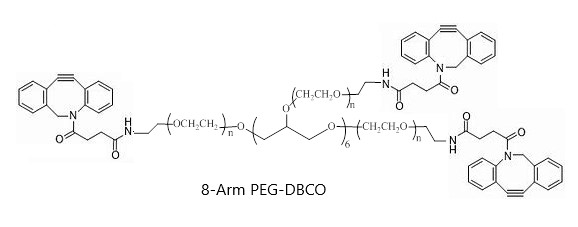Description
Dibenzocyclooctyne (DBCO) reacts with molecules containing azide (N3) in Copper-free Click Chemistry. The DBCO has high reaction selectivity toward azide, enabling its use in modifying biomolecules including peptide, protein, enzyme, live cells, whole organisms. At physiological temperature and pH, DBCO does not react with amine or hydroxyl. DBCO reacts with azide much faster than with free thiol and is one type of strained cyclooctyne. DBCO in 8-Arm PEG-DBCO is also known as ADIBO (Azadibenzocyclooctyne) or DIBAC (Dibenzoazacyclooctyne).
Properties
Molecular weight: 8-Arm PEG MW refers to the MW of the entire PEG molecule. The MW of each arm is 1/8 of the MW indicated in the product name. MW of PEG was measured by MALDI-MS or GPC. PDI (polydispersity index) of our 8-Arm PEG is 1.02-1.06 with very narrow MW distribution. The number of repeating ethylene oxide units (CH2CH2O) or the degree of polymerization is calculated dividing the PEG MW by 44 (44 is the molecular mass of one repeating unit).
Solubility: Soluble in water and aqueous buffer, chloroform, methylene chloride, DMF, DMSO, and less soluble in alcohol, toluene. Not soluble in ether.
Density: PEG density is approximately 1.125 g/mL
Physical form: PEG products generally appear as white or off-white powder, and for certain special 8-arm PEGs, it may appear as wax-like, semi-solid material due to low MW and the type of functional groups.
Storage condition: PEG product shall be stored in the original form as received in a freezer at -20C or lower for long term storage. Stock solution of PEG reagents that do not contain oxygen or moisture sensitive functional groups may be temporarily stored in a refrigerator or ambient temperature for multiple days. Stock solution should avoid repeated freeze-and-thaw cycles. See Documents section for detailed storage and handling conditions.
References
Click here to view an expanded list of hundreds of publications citing Creative PEGWorks products.


